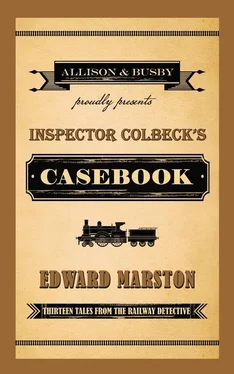Edward Marston - Inspector Colbeck's Casebook
Здесь есть возможность читать онлайн «Edward Marston - Inspector Colbeck's Casebook» весь текст электронной книги совершенно бесплатно (целиком полную версию без сокращений). В некоторых случаях можно слушать аудио, скачать через торрент в формате fb2 и присутствует краткое содержание. Год выпуска: 2014, ISBN: 2014, Издательство: Allison & Busby, Жанр: Исторический детектив, на английском языке. Описание произведения, (предисловие) а так же отзывы посетителей доступны на портале библиотеки ЛибКат.
- Название:Inspector Colbeck's Casebook
- Автор:
- Издательство:Allison & Busby
- Жанр:
- Год:2014
- ISBN:9780749014742
- Рейтинг книги:4 / 5. Голосов: 1
-
Избранное:Добавить в избранное
- Отзывы:
-
Ваша оценка:
- 80
- 1
- 2
- 3
- 4
- 5
Inspector Colbeck's Casebook: краткое содержание, описание и аннотация
Предлагаем к чтению аннотацию, описание, краткое содержание или предисловие (зависит от того, что написал сам автор книги «Inspector Colbeck's Casebook»). Если вы не нашли необходимую информацию о книге — напишите в комментариях, мы постараемся отыскать её.
Inspector Colbeck's Casebook — читать онлайн бесплатно полную книгу (весь текст) целиком
Ниже представлен текст книги, разбитый по страницам. Система сохранения места последней прочитанной страницы, позволяет с удобством читать онлайн бесплатно книгу «Inspector Colbeck's Casebook», без необходимости каждый раз заново искать на чём Вы остановились. Поставьте закладку, и сможете в любой момент перейти на страницу, на которой закончили чтение.
Интервал:
Закладка:
He broke off as he saw the look of bewilderment on the sergeant’s face. It was not Leeming’s fault that he was ignorant of opera. Detectives at Scotland Yard were not well paid and someone like Leeming would need every penny of his wage to house, clothe and feed his young family. There’d no money left to indulge an interest in classical music and opera. Colbeck chided himself for boasting about the fact that he’d actually heard the Swedish soprano. It was unfair on a man to whom names of such operatic luminaries as Jenny Lind, Alboni, Mario and Grisi meant nothing whatsoever.
‘What has this lady got to do with us, Inspector?’
‘We are going to accompany her to Birmingham,’ replied Colbeck.
‘Why?’
‘Her husband, Mr Goldschmidt, has requested police protection for her.’
Leeming was dismayed. ‘That’s no job for us,’ he protested. ‘A pair of country constables could look after her, leaving us to solve serious crimes.’
‘In this case,’ explained Colbeck, ‘we’re there to prevent a crime rather than solve one. It seems that there have been threatening letters, some of them no doubt sent by jealous rivals and therefore written out of spite. Whether or not there’s any real danger, I don’t know, but we have been assigned to look after her.’
‘The superintendent will be very annoyed to lose us on such trivial grounds.’
‘It was his idea that you and I should be chosen.’
Leeming was flabbergasted. ‘ His idea?’
‘Yes, Victor, and it was a surprise to me as well. Tallis is so hostile to the female sex in general that I couldn’t believe he actually admired a member of it. But he does, apparently, and her name is Jenny Lind.’
‘Then I’ll be very pleased to meet her. If she can arouse the superintendent’s interest, she must be a very special lady.’
‘She is,’ said Colbeck. ‘That’s why we must take great care of her.’
When she boarded the train at Euston station, Jenny Lind wore a hat with a veil in order to avoid recognition by any admirers. She was travelling with her husband, Otto Goldschmidt, a composer and conductor of international standing. The Swedish Nightingale was going to Birmingham to perform in a concert at the Town Hall. She was a short woman in her late thirties but motherhood had robbed her of her earlier daintiness. Her face was quite plain in repose but, when she smiled, it became radiant. With her veil lifted up and with her delightful broken English, she entranced Victor Leeming. He and Colbeck shared a first-class compartment with the pair. Goldschmidt was younger, taller and wore muttonchop whiskers but the detectives paid him scant attention. Their eyes were fixed on his wife.
‘It’s a pity that we’re not going to Brighton,’ suggested Colbeck.
‘Oh?’ said Jenny. ‘Why is that, Inspector?’
‘Because we might be taken there by a locomotive that bears your name. As you know, the original Jenny Lind was built just over a decade ago for the London Brighton and South Coast Railway. It was such a success that its design was adopted for use on other railways. In other words,’ he said, gallantly, ‘both on the track and on the stage, you have set the standard.’
‘There is only one Jenny Lind,’ said Goldschmidt, proudly.
‘I couldn’t agree more, sir. I had the good fortune to see your wife giving a recital in London. It was a memorable experience.’
‘Thank you.’
Conscious that Leeming was being excluded from the conversation, Colbeck sought to bring him into it by recalling an investigation they’d once made into a major crash on the Brighton line. What Leeming remembered most about the case was that it resulted in a rare treat for his family.
‘The railway company was so grateful when we’d arrested the man who’d caused the crash that it gave us first-class return tickets to Brighton. My children are still talking about our day by the seaside.’
Jenny Lind was prompted to talk about her own children and of the difficulty of leaving them — now that she and her husband had settled in England — when she had engagements in various parts of the country. One of the reasons she’d had no qualms about ending her operatic career was that she wished to spend time with her family. Colbeck suspected that she also found the concert platform more congenial and less exhausting. Once started on the subject of parenthood, Jenny and her husband talked at length and Leeming compared his own situation as a father with the problems they faced.
It was a paradox. In seeking to draw the sergeant into the conversation, Colbeck had effectively excluded himself because he and Madeleine had no children as yet and he could not therefore join in the discussion. He did not mind in the least. Even if she were not singing, it was a joy to hear Jenny Lind’s voice and he was pleased that Leeming was relishing a train journey for once instead of complaining about it. Ostensibly, the detectives were there to act as bodyguards but Colbeck couldn’t believe that anyone would wish to inflict harm on such a remarkable lady as the one sitting opposite him. Keeping an eye on her was the most rewarding assignment that he’d ever had.
As soon as they arrived at the station in Birmingham, it was clear that a veil would be unable to act as an effective disguise for the singer. Word of her arrival had spread and a large crowd of well-wishers had gathered for a glimpse of her. Reporters from local newspapers were there, autograph hunters were poised and someone had set up a camera on a tripod. Among those waiting to welcome her was Charles Rosen, the impresario who had persuaded Jenny Lind to perform in the city. He was a big, stout, flamboyantly dressed man in his fifties with a cigar in his mouth. When the train steamed into the station, he raised his top hat in triumph. She had arrived.
Jenny stepped onto the platform amid cheers and thunderous applause. Rosen had to bullock his way towards her, removing his cigar to greet her then pumping her husband’s hand. As they headed for the exit, Colbeck and Leeming stayed close to the singer to prevent her from being jostled. They came out into the street and moved towards a waiting carriage but they never reached it. A shot suddenly rang out and the crowd flew into a panic. Colbeck’s first instinct was to stand protectively in front of the singer. Leeming moved in the direction from which the shot had come. Rosen urged Jenny and her husband to get into the carriage so that they could be driven away. Reaching the vehicle, however, proved to be almost impossible in the swirling crowd. Colbeck was tripped up, Goldschmidt was thrust aside and Rosen was distracted by a second shot. Hysteria now gripped the throng and they began to run in all directions. Rosen stood beside the carriage, holding the door wide open but the only people who reached him were Colbeck and Goldschmidt. All three looked around in consternation.
‘Where’s my wife?’ demanded Goldschmidt.
Colbeck squirmed with guilt. He and Leeming had failed signally to protect Jenny Lind. Assessing the situation, he reached a grim conclusion.
‘I’m afraid that she’s been kidnapped, sir.’
It was mystifying. Hundreds of people had been milling around yet not one of them could say with certainty what had happened. Jenny had somehow been hustled away in one of the many cabs that flitted around but nobody knew in which direction it had gone. Convinced that someone had tried to kill his wife, Goldschmidt railed at the detectives for their incompetence. Rosen added his condemnation, fearing that he would lose all the money he’d spent promoting the concert and laying the blame squarely on the shoulders of Colbeck and Leeming. All four of them adjourned quickly to the police station in Digbeth to alert the local constabulary and to institute a hunt for the missing singer. When he’d calmed the two men down, Colbeck began with an apology.
Читать дальшеИнтервал:
Закладка:
Похожие книги на «Inspector Colbeck's Casebook»
Представляем Вашему вниманию похожие книги на «Inspector Colbeck's Casebook» списком для выбора. Мы отобрали схожую по названию и смыслу литературу в надежде предоставить читателям больше вариантов отыскать новые, интересные, ещё непрочитанные произведения.
Обсуждение, отзывы о книге «Inspector Colbeck's Casebook» и просто собственные мнения читателей. Оставьте ваши комментарии, напишите, что Вы думаете о произведении, его смысле или главных героях. Укажите что конкретно понравилось, а что нет, и почему Вы так считаете.












